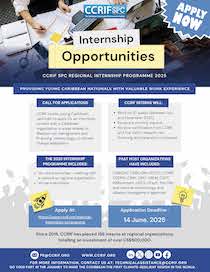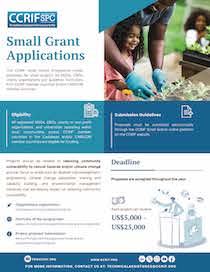Panama was under the influence of a monsoon trough and several tropical waves resulting in adverse weather conditions that occurred in the period between 25 June and 5 July, 2020. During this period, Panama was affected by heavy rains and high winds over a large area of the territory.
Tropical waves and low pressure systems occurred over the Central America region from 19 May to 2 June. During this time, adverse weather prevailed over Nicaragua that generated showers and thunderstorms.
This event briefing describes the impact of rainfall on Nicaragua, which is associated with a Covered Area Rainfall Event (CARE), starting on 20 May and ending on 2 June 2020.
- Read more about Event Briefing - Excess Rainfall - Covered Area Rainfall Event - Belize- June 9 2020
In the last days of May 2020, the first named storm of the 2020 Pacific Hurricane Season was generated. This storm – Tropical Storm Amanda – developed from a large area of low pressure associated with a tropical wave. On May 31 (0900UTC) Tropical Depression Two-E evolved into Tropical Storm Amanda over the waters south of Guatemala. Hours later Amanda weakened and dissipated. However, as it crossed Guatemala and Mexico, its remnants reorganized to form Tropical Storm Cristobal in the oceanic waters of the Gulf of Mexico.
- Read more about Event Briefing - Excess Rainfall - Covered Area Rainfall Event - Panama- June 6 2020
In the period between 23 May and 29 May, 2020, the interaction of different meteorological events generated disorganized rains over Panama. This interaction was influenced by conditions from both the Atlantic Basin and the Pacific Ocean.
This event briefing describes the impact of the precipitation on Panama, which is associated with a Covered Area Rainfall Event (CARE), starting on 27 May and ending on 29 May 2020.
In mid-May 2020, The Bahamas Department of Meteorology indicated that weather conditions in The Bahamas were under the influence of a tropical depression system resulting in an adverse weather conditions that occurred from 16 to 17 May. The Department anticipated heavy rains and high winds for the central and northern Bahamas islands.
This event briefing describes the impact of the precipitation on The Bahamas North West1 region, which is associated with a Covered Area Rainfall Event (CARE), starting on 17 May and ending on 19 May 2020.
The entry of abundant moisture from both the Caribbean Sea and the Pacific Ocean generated favorable conditions that produced prolonged periods of rain/showers and thunderstorm activity over Guatemala from the first days of May 2020. Adverse weather was produced over the North, West, East, and Centre of Guatemala.
This event briefing describes the impact of the precipitation on Guatemala, which is associated with a Covered Area Rainfall Event (CARE), starting on 9 May and ending on 20 May 2020.
A magnitude 7.7 earthquake occurred at 19:10:25 UTC on 28 January 2020 (14:10:25 local time), 125.9 km (78.2 mi) NNW of Lucea, Jamaica; 139.1 km (86.5 mi) NW of Montego Bay, Jamaica and 140.3 km (87.1 mi) WSW of Niquero, Cuba. Initial estimates from the United States Geological Survey (USGS) located the epicentre of the event at 19.440°N, 78.755°W, and at a depth of 10.0 km
A magnitude 5.3 earthquake occurred at 15:24:12 UTC on 1 November 2019, 38.6 km (24 mi) NE of Masachapa, Nicaragua; 68.1 km (42.3 mi) ENE of Diriamba, Nicaragua and 49.3 km (30.6 mi) NE of San Rafael del Sur, Nicaragua. Initial estimates from the United States Geological Survey (USGS) located the epicentre of the event (Figure 1) at 11.571°N, 86.791°W, and at a depth of 50 km (31 mi).
Under the Tropical Cyclone (TC) component of CCRIF ́s fisheries model loss calculation protocol, a report is required for any tropical cyclone affecting at least one member country with winds greater than 39 mph (62.7 km/h). For Grenada, Tropical Cyclone Karen qualified as a Loss Event3 under the TC component of the country’s COAST policy.
A tropical wave and upper level low pressure system produced periods of rain/showers and thunderstorm activity over the Turks and Caicos Islands on 29 September 2019, generating adverse weather mainly over the northwest of the Turks and Caicos Islands.





